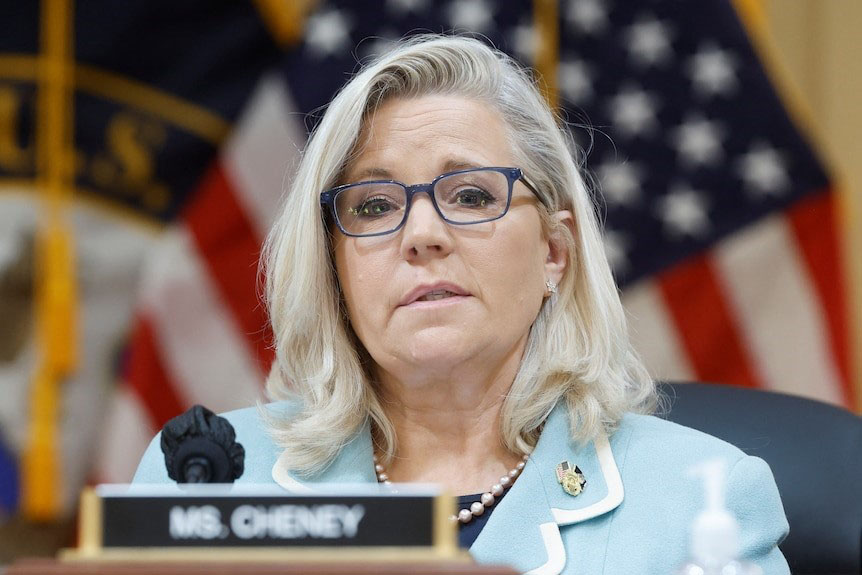WASHINGTON, (Reuters) – After being soundly rejected by Wyoming Republican voters, U.S. Representative Liz Cheney vowed to spend the next two years trying to stop Donald Trump from returning to the White House – possibly with her own anti-Trump presidential bid.
Cheney moved quickly yesterday to convert her campaign for reelection to the House of Representatives into a new political action committee after losing her nominating primary and said she was considering whether to launch a 2024 White House campaign.
Her Tuesday night defeat was a significant victory for the former president in his campaign to oust Republicans who backed his impeachment after a mob of his supporters stormed the U.S. Capitol on Jan. 6, 2021, in a failed attempt to overturn his election defeat.
“I will do whatever it takes to ensure Donald Trump is never again anywhere near the Oval Office, and I mean it,” Cheney said in her concession speech after campaigning on her duty to the U.S. Constitution and opposition to Trump’s repeated falsehoods about a stolen 2020 election.
“Let us resolve that we will stand together – Republicans, Democrats and independents – against those who would destroy our republic,” said Cheney, who serves as vice chair of the House committee on Jan. 6, a position she used throughout her reelection campaign to highlight the dangers to democracy that she says Trump and his supporters pose.
On Wednesday, Cheney told NBC’s Today Show that she would decide “in the coming months” whether to mount a White House run.
Trump ally Christian Ziegler, who is vice chair of the Florida Republican Party, said Wyoming voters sent Cheney a message of “rejection, condemnation, expulsion, retirement” and dismissed any presidential bid by her.
“Cheney has no chance at public office going forward,” he said.
Trump continues to flirt publicly with the idea of running again in 2024 but has not yet formally declared his candidacy. That has left other Republican White House hopefuls, notably Florida Governor Ron DeSantis and former Vice President Mike Pence, waiting to declare their next moves.
‘MEGAPHONE’ MOVE?
Some Republicans said Cheney would not expect to win the party nomination if she ran, but rather would devote her energies to keeping Trump from victory – a role she could play even without a formal candidacy.
“She knows she won’t beat Trump in a Republican primary. But her candidacy would give her an opportunity — and a megaphone,” said Charlie Sykes, a former Wisconsin conservative radio talk show host and frequent Trump critic. “She would be a constant thorn in his side.”
Analysts said Cheney could find herself barred from any primary debates, as Republican Party officials cut contact with perceived threats to Trump. An independent run could backfire and inadvertently help Trump by drawing independent voters and moderate Republicans away from his Democratic rival.
Brendan Buck, a one-time aide to former House Speaker Paul Ryan, said Cheney and her advisors would have to think long and hard about how best to oppose Trump.
“That doesn’t even necessarily mean she needs to be on the ballot,” Buck said. “She may just be running a campaign from the outside. And that means raising money, being a spokesperson, pulling together different political organizations and factions.”
After her defeat in Wyoming, Cheney filed documents with the Federal Election Commission to convert her campaign into a leadership PAC called “The Great Task,” a phrase President Abraham Lincoln used in his famed Gettysburg Address, during the nation’s 19th Century Civil War.
Cheney is expected to use the organization to educate the public about the threat she believes Trump presents and to mobilize efforts to oppose any presidential campaign by him.
She noted in her concession speech that Lincoln, regarded as one of the greatest American presidents, lost — and admitted to losing — multiple races before winning the presidency.
Her campaign had about $7.5 million in cash on hand at the end of July.
Cheney, who was first elected to Congress in 2016, has won national praise from Trump critics for her prominent role on the Jan. 6 committee.
Despite her principled stand against lies and insurrection, she has been criticized by what many Republicans, in Wyoming and elsewhere, regard as her disloyalty to their party’s charismatic leader.
“A lot of this just emphasizes the fact that so much of our politics is no longer about policy, but about the question of Trump and where you stand in relation to him,” said Matthew Continetti, senior fellow at the conservative American Enterprise Institute.






